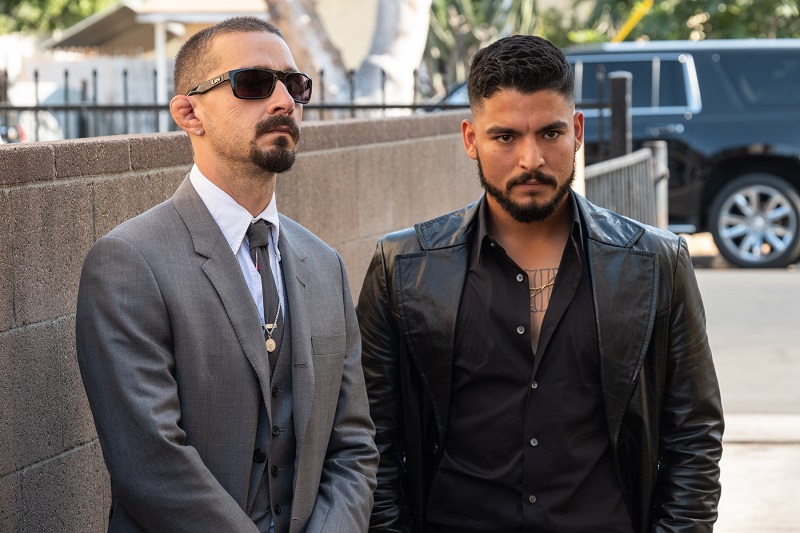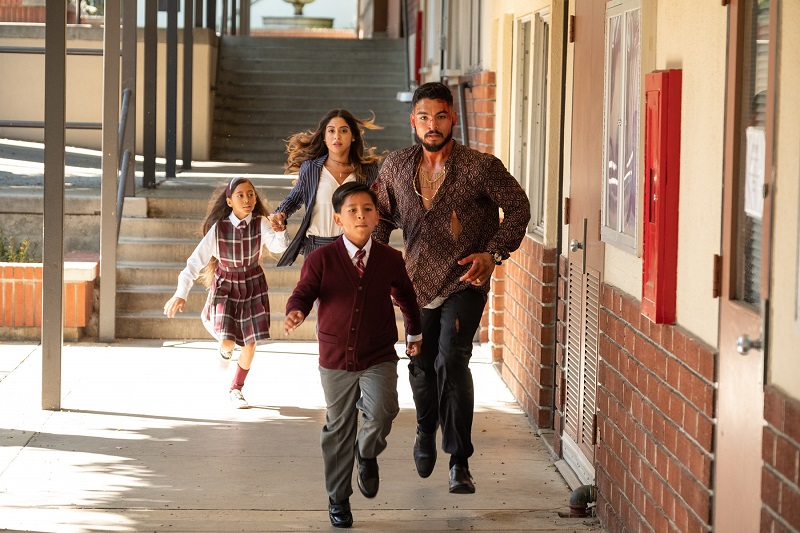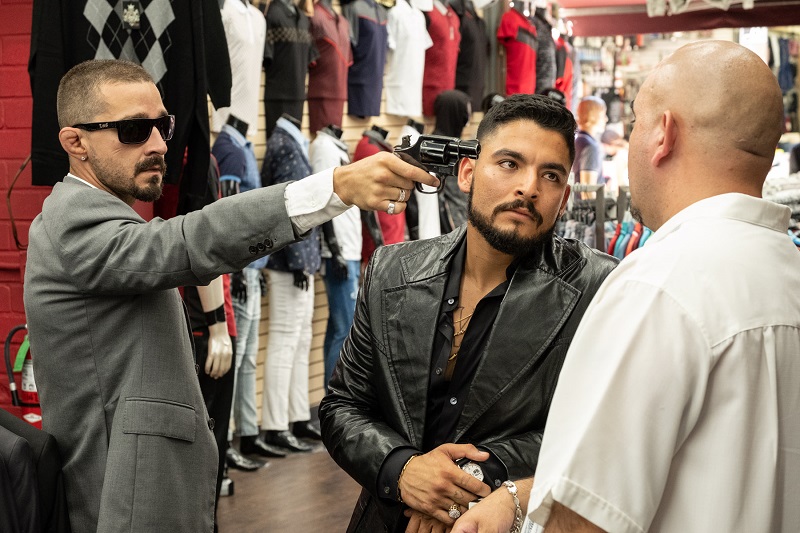For The Tax Collector star Bobby Soto, representation is everything. For him to headline a Hollywood movie from the writer-director of Fury and End of Watch, life is an enormous blessing.

The Movie Mensch caught up with the actor for an exclusive interview where he gave us the inside scoop on how this project came to be, how he and co-star Shia LaBeouf have become “best friends” who are actively working to change the lives of South Los Angeles citizenry, and how he and writer-director David Ayer started their journey as dojo-sharing friends. A working relationship blossomed much later.
Ayer’s (who also wrote Training Day and The Fast and the Furious) latest film follows Soto’s David, who is charged with making the rounds around dozens of Los Angeles gangs and picking up their “taxes.” Driving David and providing the muscle and heightened fear factor is Creeper (LaBeouf), who lays down the law using any means necessary. Things are going swimmingly and have for some time. But when Conejo (Jose Conejo Martin) gets out of prison, things get bloody. Their right to collect from the gangs of the City of Angels is challenged, violently. Things get personal when David’s new nemesis targets his wife and young children.
The Tax Collector debuts in theaters, On Demand and On Digital August 7.
The Movie Mensch: I’ve loved David Ayer’s work for years, from the writing of Training Day to End of Watch, which I think is a modern classic, and Fury. For you, what sets David Ayer apart?
Bobby Soto: For me personally, David Ayer is an intimate conversation we’re going to have now because I grew up watching his films. Not knowing, of course, who he was—because how I grew up, I wasn’t asking, “Who’s the director?” That didn’t dawn on me that it was of importance until I became an actor. I grew up watching The Fast and the Furious. I grew up watching Training Day. That’s everyone’s all-time classic. Anyone from LA, that grew up in LA, or that knows that lifestyle, Training Day’s their number one movie. Then, years later, here comes End of Watch. This is another movie that you go, “Yep. This is accurate.” These stories are stories that are authentic, and they hit home, and they’re intimate.
The Movie Mensch: How did you and David first meet?
Bobby Soto: I didn’t know who David was, I met him at a Dojo. We became genuine friends. I would spar with him, work out with him. I was there for about a year and a half. I’m getting to know everybody, and one of the guys was David. I didn’t know who he was or what he did. He didn’t know who I was, or what I did. He came to my family weddings and some celebrations, and I came to his house. We were friends, really good friends. A few months into our friendship, he asked me what I did, and what I liked doing. I told him, “I’m an actor.” Then I asked him what he did and he’s like, “Oh, I’m a director.” I was like, “Cool.” So, he goes, “You ever heard of Training Day?” I was like, “Yeah, what about it?” He’s like, “I wrote it.” Then he’s like, “You ever saw End of Watch?” “Yup.” He’s like, “I did that one, too.” I was like, “Oh, all right. That is cool.” He’s like, “I want to work with you.” I was like, “Okay.” Then one day he called me and said, “Let’s make a movie.” So, we did it, and here we are today.

The Movie Mensch: You’re headlining a Hollywood movie…
Bobby Soto: It [is] really an honor. He gave me this great opportunity and blessed my life, and now I have the greatest relationship with Shia. Him and I are best friends. We opened up a theater company in South Los Angeles, where I grew up.
The Movie Mensch: Why do you think David so understands the streets, particularly of LA?
Bobby Soto: David [and I] actually grew up in literally the same block. Literally, he grew up in the same neighborhood that I grew up in. Yeah, just different generations. So, when I met him, it was like our life came full circle. We met each other and we made this movie, which was just phenomenal, and now I have people I’m going to take with me for the rest of my life, and friends, mentors, whatever. I owe a lot to it to David Ayer, welcoming me into the Hollywood household.
The Movie Mensch: What is it about David that he has always had a keen eye for storytelling that involves the Latinx perspective?
Bobby Soto: You have these conversations about not having enough Latin representation or Hispanic representation in Hollywood, or what have you. But David’s someone that’s made his name up there in the industry. He’s got enough pull and juice to get a movie like this funded, and put a brown person as the lead, and make it work, and have people like it. It’s a big gamble. It’s hard when you don’t have someone that’s in that high ranking level, that’s representing the brown faces. We don’t have an Oprah. We don’t have a Jay-Z or a Denzel (Washington). You know what I mean?
The Movie Mensch: Yeah, absolutely.

Bobby Soto: We don’t have those high ranking individuals that can look for the youth that represents their generation, and go, “Okay, we’re going to bring him in under our wing and show him the ropes, or her the ropes, and teach them. That way they carry on the legacy, and continue doing the same work, and giving back to their people.” We’re lucky and blessed that David Ayer is someone in the industry that cares about the Chicano representation. Because there’s a lot of people that like to talk. Why don’t we take action? And David Ayer, of course, this is his result. He took action. He’s always including a Chicano story. Let’s not forget, in Suicide Squad, Jay Hernandez was probably considered the first Latino superhero, or antihero, in all of the DC films. Jay Hernandez played El Diablo, this cholo guy that has all these tattoos. He’s like a God. David’s always including the brown person because he knows that that’s a story that needs to be told. He made this, and I’m blessed that he gave me that opportunity. I’m forever grateful. It’s like he is a big brother to me.
The Movie Mensch: That leads me to my next question. There’s always pressure with anything you do, TV, film, a big part, a small part. But the thing that got me about The Tax Collector is that you’re in almost every scene. And how is that for you, stress-wise? But also, as an actor, that’s what you dream of. Also, as you mentioned, there’s a representation there, and you’re there front and center. Do you feel any kind of pressure from that angle?
Bobby Soto: No stress, man. Just blessed. Really inspired. There’s two words that define the process of making movies and TV shows or acting in general, one is perseverance, and second is stamina. You have to persevere to continue, because of course, like we just discussed, there’s not enough representation, or not enough jobs or opportunities that give you that leading man or leading woman for the brown person. It wasn’t stressful for me at all. If anything, I was super excited. I felt like, “Dang, I get to play every day and do what I dream of.” I was only happy every moment on set. Even to this day, I’m like, “Whatever this opens up, whatever this brings, bring it in. I want more of it.”
The Movie Mensch: What was the first thing that grabbed your heart, when you read that script for The Tax Collector? What just boiled right up to the top?

Bobby Soto: Man. You’re really having me think about it. [Long pause]
The Movie Mensch: It’s a good thing.
Bobby Soto: Yeah, that is a good thing. That’s the first time I’ve been asked that. Man, when I read the script, I was kind of like we were collaborating together as David was writing the script. So, as he was writing the script, we were already in process. A lot of it is intimate, and a lot of it was like, “Yup. I, Bobby, I know what it feels like to lose something. I know what it feels like to not have something that I want. I know what it feels like to risk everything for someone.” And that’s what the movie is. That hit me because we all go through that. Not just me. We’re all tested in our life, one way or another, with decisions and with the repercussions of our decisions and the consequences that come with whatever we choose to do in our lives. We have to live up to those decisions and take responsibility. And the test is like, are you a man? Are you a woman? Are you going to stand up for the things you really believe in? Are you going to die for the things that you believe in? Will you? Or are you going to turn around and go somewhere else and hide? Or you say, like the Zapata saying, “I’d rather die on my feet as a man, than slave and live on my knees.”

